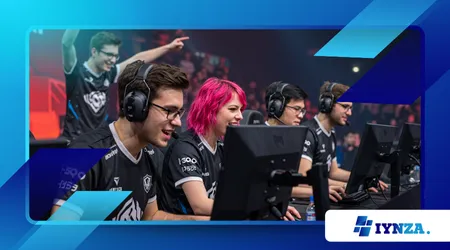How to Join an Esports Team: A Beginner’s Guide

Joining an esports team might seem like a dream reserved for elite players, but it’s more accessible than most people think. With dedication, structure, and the right guidance, even beginners can start carving a path into competitive gaming.
Anúncios
That’s why understanding how to join an esports team is more than just learning where to sign up—it’s about building yourself into someone teams want to recruit.
In this guide, you’ll learn how to prepare your skills, build your reputation, connect with the right communities, and take real steps toward joining a team. Whether you’re aiming for casual competition or dreaming of going pro, this is your starting point.
Focus on One Game and Master It
Every journey into esports starts with choosing the right game. Pick one that fits your interests, suits your playstyle, and has an active competitive scene.
Trying to spread yourself across multiple titles can dilute your progress. The best players specialize. They know every mechanic, every meta shift, every nuance.
Choose a title like Valorant, League of Legends, Counter-Strike 2, Rocket League, or Overwatch 2—games with active esports ecosystems and clear pathways from ranked play to pro scenes.
Reach a Competitive Rank
No team will take a chance on someone who hasn’t proven themselves in ranked play. Your in-game rank is often the first filter used by coaches and recruiters.
But ranking up isn’t just about bragging rights. It shows consistency, adaptability, and growth.
Train daily. Watch your replays. Fix bad habits. Aim to land in the top 10–15% of the player base for your game.
A 2025 analysis by GameStat Lab showed that 87% of players recruited to amateur teams ranked Diamond or higher in their respective titles.
Read also: How to Build the Ultimate Retro Gaming Setup
Build a Routine Like an Athlete
Esports isn’t just gaming. It’s performance. You need a daily routine that includes:
- Mechanical practice (aim trainers, combos, micro drills)
- Match analysis
- Physical care (hydration, hand stretches, breaks)
- Mental resets (meditation, focus drills)
You don’t need to grind 12 hours a day. What matters is structure. A solid 2–4 hour block of focused training is more effective than a scattered day of casual play.
Join Online Tournaments and Scrims
Playing ranked is one thing—competing in tournaments is another. Start small. Join weekly community events, amateur ladders, or Discord-hosted scrims.
Sites like FACEIT, ESL Play, Challengermode, and Battlefy host regular competitions. Many are open to anyone.
This is how you gain experience under pressure, build confidence, and start showing up on other players’ radar.
Use Discord and Social Media Strategically
The esports scene is network-driven. You need to be active in the right communities.
Join Discord servers focused on your game. Engage in discussions. Ask for scrim partners. Share clips.
Use social media to build your presence. Post highlights, results, and even breakdowns of your own mistakes. Show growth. Show hunger.
Teams don’t just look for skill—they look for players who are coachable, visible, and consistent.
Create a Player Portfolio
Think of your profile like a résumé. It should include:
- Your gamer tag, region, and main role
- Game and platform
- Rank and achievements
- Notable scrim or tournament results
- Links to gameplay footage or Twitch/YouTube
You can host this on a free platform like Carrd, Notion, or even a pinned tweet. The goal is to make it easy for a coach to see what you bring.
Join a Free Agent Server or LFT Forum
Most competitive games have dedicated “Looking For Team” communities. These are Discord servers, Reddit threads, or platform-specific forums.
List yourself with clear info. Don’t just say “looking for team.” Include your main role, schedule, goals, and what kind of environment you want.
Example: A support main in Overwatch who specified “team-focused, non-toxic, voice-active” found three tryout offers in a single weekend after updating their profile.
Be Open to Smaller Teams First
Everyone wants to go pro—but most players start on small community teams.
These teams offer valuable practice in communication, teamwork, and scrim scheduling. They may not pay, but they provide the environment needed to evolve.
Commit, be reliable, and treat it like a job. Most pros started here—and you’ll build reputation faster than you think.
One Analogy to Remember
Joining an esports team is like making a band. You need to be skilled on your instrument, but also reliable, aware, and ready to harmonize. Talent alone doesn’t win matches—coordination does.
A Statistic That Reinforces the Process
According to a 2024 report by Competitive Insights Global, 73% of players in Tier 2 and Tier 3 esports teams were recruited from amateur Discord communities or open tournament circuits—not from ranked leaderboards alone.
Conclusion
Learning how to join an esports team isn’t about shortcuts or tricks. It’s about consistent growth, smart networking, and treating your progress seriously.
Start with one game. Rank up. Compete. Engage with the community. Build your profile. And stay ready.
In esports, opportunity rarely knocks—it waits for you to prove you deserve the door.
FAQ – How to Join an Esports Team
1. Do I need to be a certain age to join an esports team?
Most amateur teams accept players 13+, but tournaments often require players to be 16 or 18 depending on the region.
2. Can console players join esports teams?
Yes. Many teams recruit from console scenes, especially in titles like Call of Duty and Rocket League.
3. Do I need streaming experience?
It’s not required, but showcasing your gameplay through clips or live play helps teams see how you perform.
4. Should I pay to join a team?
No. Legitimate teams do not charge tryout or membership fees. Be cautious of pay-to-play “organizations.”
5. What’s the best way to get noticed?
Play in open tournaments, be active in Discord communities, and consistently share your progress and highlights online.
6. Is coaching important at the beginner level?
While not essential, working with a coach or mentor can accelerate improvement and teach you how to operate in team settings.
7. Do I need to specialize in a single role?
Yes. While flexibility helps, teams recruit based on specific roles and specialties. Pick your strength and focus.
8. Can I join a team without being top rank?
It’s possible, especially for community teams, but higher ranks open more doors and signal skill.
9. Are college esports programs a good entry point?
Absolutely. Many college teams now compete nationally and offer scholarships—great for exposure and development.
10. How long does it take to join a team?
It varies. Some players find teams in weeks, others take months. The key is to keep improving and stay visible.
